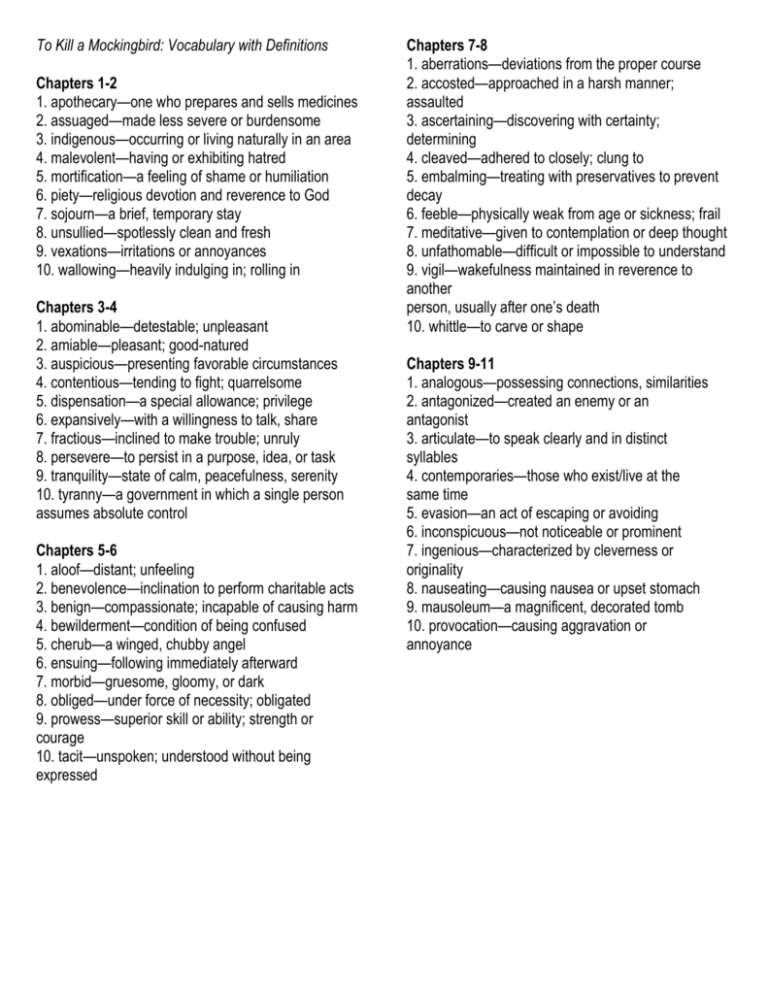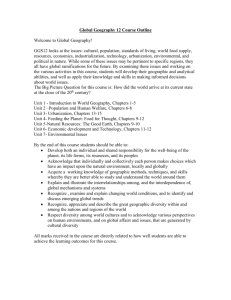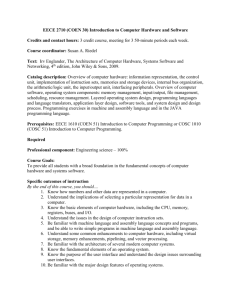To Kill a Mockingbird: Vocabulary with Definitions
advertisement

To Kill a Mockingbird: Vocabulary with Definitions Chapters 1-2 1. apothecary—one who prepares and sells medicines 2. assuaged—made less severe or burdensome 3. indigenous—occurring or living naturally in an area 4. malevolent—having or exhibiting hatred 5. mortification—a feeling of shame or humiliation 6. piety—religious devotion and reverence to God 7. sojourn—a brief, temporary stay 8. unsullied—spotlessly clean and fresh 9. vexations—irritations or annoyances 10. wallowing—heavily indulging in; rolling in Chapters 3-4 1. abominable—detestable; unpleasant 2. amiable—pleasant; good-natured 3. auspicious—presenting favorable circumstances 4. contentious—tending to fight; quarrelsome 5. dispensation—a special allowance; privilege 6. expansively—with a willingness to talk, share 7. fractious—inclined to make trouble; unruly 8. persevere—to persist in a purpose, idea, or task 9. tranquility—state of calm, peacefulness, serenity 10. tyranny—a government in which a single person assumes absolute control Chapters 5-6 1. aloof—distant; unfeeling 2. benevolence—inclination to perform charitable acts 3. benign—compassionate; incapable of causing harm 4. bewilderment—condition of being confused 5. cherub—a winged, chubby angel 6. ensuing—following immediately afterward 7. morbid—gruesome, gloomy, or dark 8. obliged—under force of necessity; obligated 9. prowess—superior skill or ability; strength or courage 10. tacit—unspoken; understood without being expressed Chapters 7-8 1. aberrations—deviations from the proper course 2. accosted—approached in a harsh manner; assaulted 3. ascertaining—discovering with certainty; determining 4. cleaved—adhered to closely; clung to 5. embalming—treating with preservatives to prevent decay 6. feeble—physically weak from age or sickness; frail 7. meditative—given to contemplation or deep thought 8. unfathomable—difficult or impossible to understand 9. vigil—wakefulness maintained in reverence to another person, usually after one’s death 10. whittle—to carve or shape Chapters 9-11 1. analogous—possessing connections, similarities 2. antagonized—created an enemy or an antagonist 3. articulate—to speak clearly and in distinct syllables 4. contemporaries—those who exist/live at the same time 5. evasion—an act of escaping or avoiding 6. inconspicuous—not noticeable or prominent 7. ingenious—characterized by cleverness or originality 8. nauseating—causing nausea or upset stomach 9. mausoleum—a magnificent, decorated tomb 10. provocation—causing aggravation or annoyance VOCAB: PART TWO Chapters 12-13 1. acquired—obtained possession of something 2. altercation—an angry dispute; quarrel 3. compensation—something given to make up for something else 4. contemptuously—showing contempt; scornfully 5. ecclesiastical—having to do with the church or the clergy 6. formidable—hard to overcome or deal with 7. inconsistent—not consistent; not in agreement 8. permanence—being permanent; lasting 9. prerogative—a right or privilege 10. qualms—sudden, disturbing feelings of uneasiness Chapters 14-15 1. edification—intellectual, spiritual, or moral improvement 2. inaudible—not audible; cannot be heard 3. indulged—gave in to one’s pleasures; had what one wanted 4. obscure—not clearly expressed; hard to understand 5. peculiarities—strange or unusual qualities 6. penitentiary—a prison for criminals 7. perish—to be destroyed; die 8. placid—pleasantly calm or peaceful; quiet 9. quarrel—an angry dispute or disagreement 10. resignation—the act of resigning, withdrawing Chapters 16-17 1. acrimonious—bitter, stinging, or caustic in nature or speech 2. corroborating—making more certain; doublechecking; conspiring 3. countenance—appearance; face 4. frank—direct and unreserved in speech 5. grudge—a feeling of resentment or ill-will 6. gullet—the esophagus; throat 7. lurched—staggered; stumbled 8. profane—hold contempt for, usually towards God or sacred principles 9. scrutiny—a thorough searching; a close examination or inquiry 10. subpoena—a summons for witnesses or evidence before a court Chapters 18-19 1. acquainted—familiar; having personal knowledge of 2. brash—tactless; bold 3. browbeating—intimidating; bullying 4. expunge—strike out; erase 5. lavations—washings; the process of bathing 6. pilgrimage—a journey or long quest for knowledge or religious reasons 7. predicament—an unpleasant situation 8. proceedings—a particular course of action 9. volition—the act of making a conscious decision 10. wrathfully—with great anger, hatred, or ill-will Chapters 20-21 1. acquit—declare someone innocent 2. contraband—goods that are illegally imported or exported 3. corrupting—causing to be immoral or dishonest 4. detachment—lack of interest or involvement 5. discreet—careful; good at keeping secrets 6. indicted—formally charged with a crime 7. perpetuated—made something last, go on 8. temerity—reckless, offensive boldness 9. vengeance—punishment in return for a wrong 10. verdict—a decision made by a jury Chapters 22-23 1. aggravate—to annoy or anger someone 2. appeal—an earnest or urgent request 3. cynical—distrustful of human nature 4. diction—clarity when speaking; choice of words 5. fatalistic—resigning to fate; allowing what happens to happen 6. fret—to worry 7. heathen—someone who deliberately insults religion, God, or a way of life 8. resentments—feelings of ill-will toward someone 9. statute—a law enacted by legislature 10. vehement—with conviction or force Chapters 24-25 1. adjourned—suspended until a later time 2. apprehension—hesitation 3. bellows—a device for blowing air on a flame in order for it to grow 4. devout—devoted to divine worship or service 5. duress—constant threat; coercion 6. hypocrite—someone who pretends to have virtues, moral or religious beliefs, etc. that he or she does not possess 7. navigate—to find one’s way 8. squalid—foul and repulsive; neglected 9. varmint—an undesirable animal, usually a scavenger 10. veneer—a thin surface layer Chapters 26-28 1. carcass—the body of a human or animal 2. contraption—a mechanical gadget or device 3. crooning—a soft singing or humming 4. eccentricities—oddities or peculiarities in conduct 5. furtive—secret or shifty; sneaky 6. gait—a manner of walking or trotting 7. notoriety—the state of being known for some unfavorable act or quality 8. recluse—a person shut off or apart from the world; someone living in seclusion 9. staccato—disconnected, shortened, detached sound 10. subordinates—those who are lower in rank or of secondary importance Chapters 29-31 1. acquiescence—agreement or consent by silence 2. connived—cooperated in secret; conspired 3. contradict—to assert the contrary or opposite of 4. craw—the stomach of an animal 5. eluded—avoided or escaped by cleverness or speed 6. garishly—with excessive ornateness or brightness 7. hearse—a vehicle for conveying a dead person to the place of burial 8. reprimand—a severe reproof or rebuke 9. sedative—tending to calm or soothe; a calming drug or agent 10. turmoil—a state of great commotion or unrest






